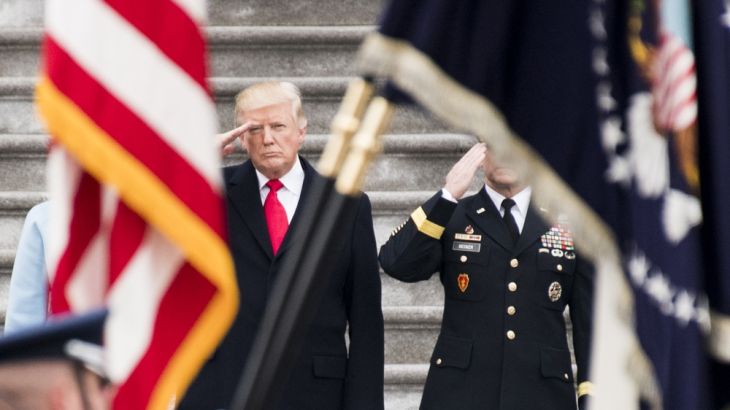
Donald Trump: All the President’s Profits
Is Donald Trump profiting from the presidency? And if so what are the consequences for democracy in the US?
As a candidate, Donald Trump railed against corruption on the campaign trail. And he used the perception of many Americans that their political system is rigged against them to win the White House.
But as president, Trump has mixed private business and public duties in unprecedented ways.
Keep reading
list of 4 itemsWho benefits from US tariffs on Chinese imports? Experts weigh in
‘Any time, any place’: Biden and Trump agree to June and September debates
Biden slaps new tariffs on Chinese imports, ratcheting trade war
Previous US presidents put their financial assets into a blind trust and sold their businesses before inauguration, to avoid the possibility of conflicts of interest.
”I
unprecedented, at least in living memory. But not an aberration in the sense that he’s just completely isolated out there in the middle of nowhere. I would call him something closer to an apotheosis, of a trend that’s been developing and developing and developing. And he’s just kind of brought it out of the closet.”]
But Trump refused to divest from the more than 500 companies he owns under the umbrella of the Trump Organization. Instead, he put them into a trust and handed over day-to-day management to his sons.
“When Donald Trump said he was giving up running the businesses and putting it into a trust, I literally erupted in laughter. Donald Trump doesn’t run any businesses, he is not a competent businessman. He leaves it up to other people. And furthermore, the trust that Donald set up, the sons have said they tell dad what’s going on in the business,” says David Cay Johnston, editor of DC Report and author of The Making of Donald Trump and It’s Even Worse Than You Think.
“He can reach in and withdraw money at any time. Whether or not he has done so, we don’t know. But this is not anything at all like a blind trust. This is like what you expect to see in a family business posing as a country,” he adds.
The overlap between Trump’s business activities and his role as president has given rise to allegations that he is leveraging his office for personal gain.
These charges are laid out in a series of lawsuits, which allege that Trump is violating the Emoluments Clauses of the US Constitution, by accepting payments or benefits from foreign states as well as federal and state governments.
The attorney general for the District of Columbia, Karl Racine, calls the Emoluments Clauses the United States’ “oldest anti-corruption law.”
With the attorney general of Maryland, Racine has brought a lawsuit (known as D.C. and Maryland v. Trump) focused on the Trump International Hotel in Washington, DC, and the payments or benefits from foreign and domestic governments the president may be receiving there.
Fault Lines examines how the president’s business dealings may have put him in conflict with the US constitution. And in a fractious mid-term election season, we ask constitutional law scholars and international corruption experts why it matters for democracy in the US.